【人教版英语七年级上册】Unit 2 知识点1:指示代词This & That
- 格式:pdf
- 大小:402.74 KB
- 文档页数:10
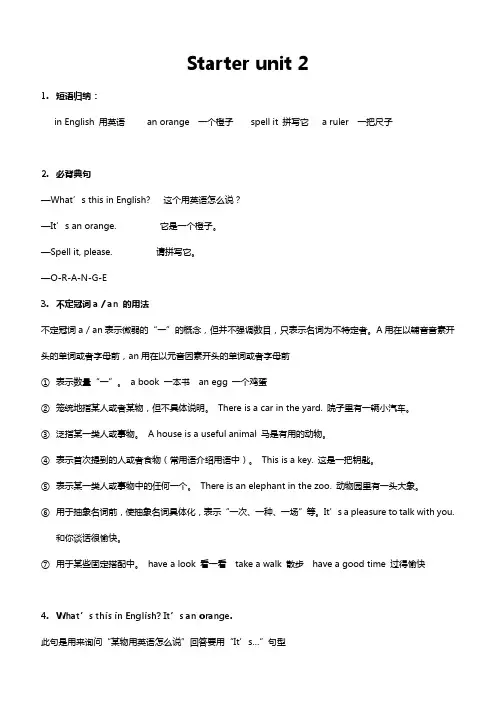
Starter unit 21.短语归纳:in English 用英语an orange 一个橙子spell it 拼写它 a ruler 一把尺子2.必背典句—What’s this in English? 这个用英语怎么说?—It’s an orange. 它是一个橙子。
—Spell it, please. 请拼写它。
—O-R-A-N-G-E3.不定冠词a / an 的用法不定冠词a / an表示微弱的“一”的概念,但并不强调数目,只表示名词为不特定者。
A用在以辅音音素开头的单词或者字母前,an用在以元音因素开头的单词或者字母前①表示数量“一”。
a book 一本书an egg 一个鸡蛋②笼统地指某人或者某物,但不具体说明。
There is a car in the yard. 院子里有一辆小汽车。
③泛指某一类人或事物。
A house is a useful animal 马是有用的动物。
④表示首次提到的人或者食物(常用语介绍用语中)。
This is a key. 这是一把钥匙。
⑤表示某一类人或事物中的任何一个。
There is an elephant in the zoo. 动物园里有一头大象。
⑥用于抽象名词前,使抽象名词具体化,表示“一次、一种、一场”等。
It’s a pleasure to talk with you.和你谈话很愉快。
⑦用于某些固定搭配中。
have a look 看一看take a walk 散步have a good time 过得愉快4.What’s this in English? It’s an orange.此句是用来询问“某物用英语怎么说”回答要用“It’s…”句型this是指示代词,意为“这,这个”,指近处的人或者事物。
that也是指示代词,意为“那,那个”,指较远处的人或者事物。
in English意为“用英语”。
表示“用……语言”用介词in。
例: What’s this in Chinese? It’s Jiaozi. 这个用汉语怎么说?这是饺子。
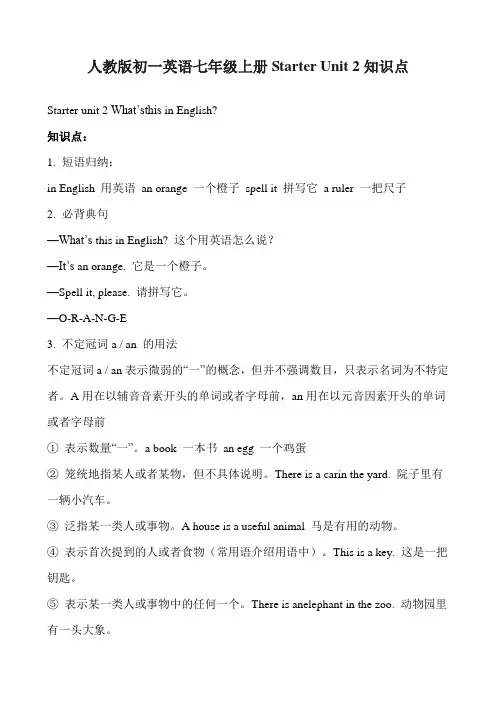
人教版初一英语七年级上册Starter Unit 2知识点Starter unit 2 What’sthis in English?知识点:1. 短语归纳:in English 用英语an orange 一个橙子spell it 拼写它a ruler 一把尺子2. 必背典句—What’s this in English? 这个用英语怎么说?—It’s an orange. 它是一个橙子。
—Spell it, please. 请拼写它。
—O-R-A-N-G-E3. 不定冠词a / an 的用法不定冠词a / an表示微弱的“一”的概念,但并不强调数目,只表示名词为不特定者。
A用在以辅音音素开头的单词或者字母前,an用在以元音因素开头的单词或者字母前①表示数量“一”。
a book 一本书an egg 一个鸡蛋②笼统地指某人或者某物,但不具体说明。
There is a carin the yard. 院子里有一辆小汽车。
③泛指某一类人或事物。
A house is a useful animal 马是有用的动物。
④表示首次提到的人或者食物(常用语介绍用语中)。
This is a key. 这是一把钥匙。
⑤表示某一类人或事物中的任何一个。
There is anelephant in the zoo. 动物园里有一头大象。
⑥用于抽象名词前,使抽象名词具体化,表示“一次、一种、一场”等。
It’s a pleasureto talk with you. 和你谈话很愉快。
⑦用于某些固定搭配中。
have a look 看一看take a walk 散步have a good time 过得愉快4. What’s this inEnglish? It’s an orange.此句是用来询问“某物用英语怎么说”回答要用“It’s…”句型this是指示代词,意为“这,这个”,指近处的人或者事物。
that也是指示代词,意为“那,那个”,指较远处的人或者事物。
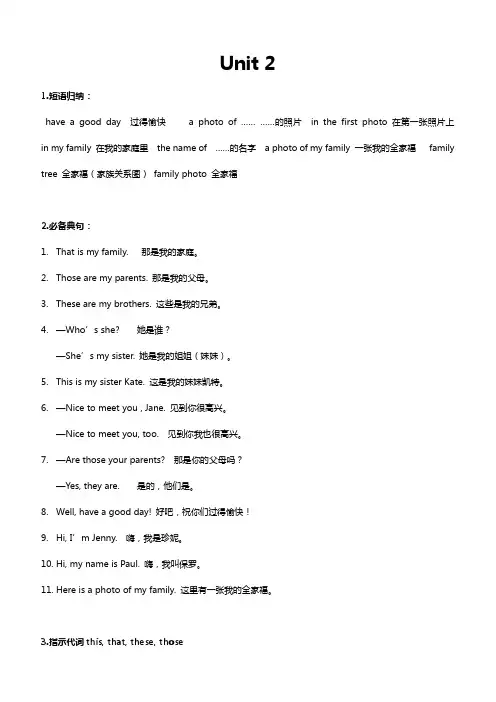
Unit 21.短语归纳:have a good day 过得愉快 a photo of …………的照片in the first photo 在第一张照片上in my family 在我的家庭里the name of ……的名字 a photo of my family 一张我的全家福family tree 全家福(家族关系图)family photo 全家福2.必备典句:1.That is my family. 那是我的家庭。
2.Those are my parents. 那是我的父母。
3.These are my brothers. 这些是我的兄弟。
4.—Who’s she? 她是谁?—She’s my sister. 她是我的姐姐(妹妹)。
5.This is my sister Kate. 这是我的妹妹凯特。
6.—Nice to meet you , Jane. 见到你很高兴。
—Nice to meet you, too. 见到你我也很高兴。
7.—Are those your parents? 那是你的父母吗?—Yes, they are. 是的,他们是。
8.Well, have a good day! 好吧,祝你们过得愉快!9.Hi, I’m Jenny. 嗨,我是珍妮。
10.Hi, my name is Paul. 嗨,我叫保罗。
11.Here is a photo of my family. 这里有一张我的全家福。
3.指示代词this, that, these, those1.指示代词是表示“这个,那个,这些,那些”的代词,其中this和these是指距离说话人较近的人或者事物;that和those是指离或华人较远的人或者事物。
2.指示代词this, that作主语时,连系动词be用单数形式is,同时后面的名词用单数形式。
当these, those作主语时,连系动词be用复数形式are,同时后面的名词用复数形式。
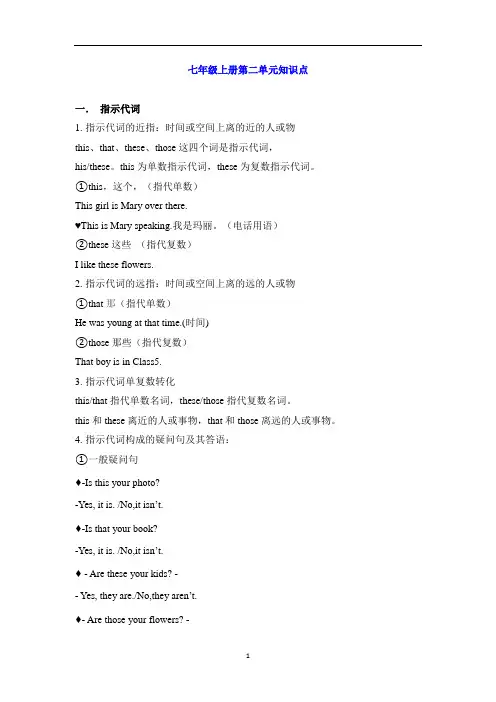
七年级上册第二单元知识点一.指示代词1.指示代词的近指:时间或空间上离的近的人或物this、that、these、those这四个词是指示代词,his/these。
this为单数指示代词,these为复数指示代词。
①this,这个,(指代单数)This girl is Mary over there.♥This is Mary speaking.我是玛丽。
(电话用语)②these这些(指代复数)I like these flowers.2.指示代词的远指:时间或空间上离的远的人或物①that那(指代单数)He was young at that time.(时间)②those那些(指代复数)That boy is in Class5.3.指示代词单复数转化this/that指代单数名词,these/those指代复数名词。
this和these离近的人或事物,that和those离远的人或事物。
4.指示代词构成的疑问句及其答语:①一般疑问句♦-Is this your photo?-Yes, it is. /No,it isn’t.♦-Is that your book?-Yes, it is. /No,it isn’t.♦ - Are these your kids? -- Yes, they are./No,they aren’t.♦- Are those your flowers? -- Yes, they are./No,they aren’t.②特殊疑问句♦- Who is this?- It's my dad.- Who is this?- It's my dad.♦-Who’s that?-This is Bob speaking.二.Who1.Who pron.谁,特殊疑问词Whom宾格Whose所有格2.Who 与be 缩写Who is=who’sWho are=who are3.who特殊疑问句3.1单数-Who’s she?-She is my sister.3.2复数-Who’re they?-They are my parents.三.名词复数1. 名词的分类名词分为可数名词不可数名词。
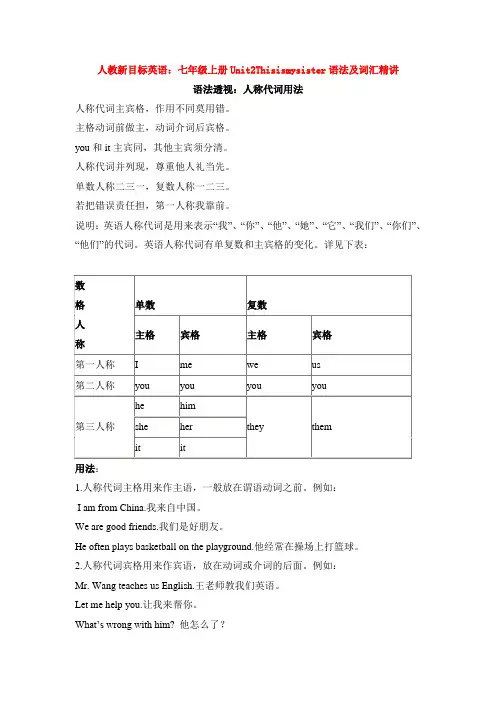
人教新目标英语:七年级上册Unit2Thisismysister语法及词汇精讲语法透视:人称代词用法人称代词主宾格,作用不同莫用错。
主格动词前做主,动词介词后宾格。
you和it主宾同,其他主宾须分清。
人称代词并列现,尊重他人礼当先。
单数人称二三一,复数人称一二三。
若把错误责任担,第一人称我靠前。
说明:英语人称代词是用来表示“我”、“你”、“他”、“她”、“它”、“我们”、“你们”、“他们”的代词。
英语人称代词有单复数和主宾格的变化。
详见下表:用法:1.人称代词主格用来作主语,一般放在谓语动词之前。
例如:I am from China.我来自中国。
We are good friends.我们是好朋友。
He often plays basketball on the playground.他经常在操场上打篮球。
2.人称代词宾格用来作宾语,放在动词或介词的后面。
例如:Mr. Wang teaches us English.王老师教我们英语。
Let me help you.让我来帮你。
What’s wrong with him? 他怎么了?3.两个或两个以上的人称代词并列作主语时,排列顺序为:单数人称二、三、一,复数人称一、二、三。
例如:You ,she and I are good friends.我,你和她都是好朋友。
We, you and they all like music.我们,你们和他们都喜欢音乐。
4.当I与其他词语一起并列作主语时,I要放在后面,但承认错误时,I要放在前面。
例如:She and I are in the same school.她和我在同一个学校。
I and he make mistakes.我和他犯了错误。
语法精讲:指示代词指示代词(demonstrative pronoun)是表示指示概念的代词,即用来指示或标识人或事物的代词。
指示代词与定冠词和人称代词一样,都具有指定的含义,用来起指示作用,或用来代替前面已提到过的名词。
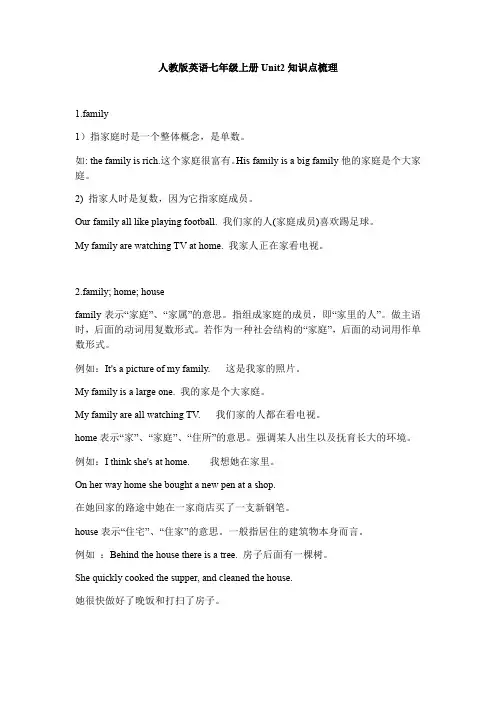
人教版英语七年级上册Unit2知识点梳理1.family1)指家庭时是一个整体概念,是单数。
如: the family is rich.这个家庭很富有。
His family is a big family他的家庭是个大家庭。
2) 指家人时是复数,因为它指家庭成员。
Our family all like playing football. 我们家的人(家庭成员)喜欢踢足球。
My family are watching TV at home. 我家人正在家看电视。
2.family; home; housefamily表示“家庭”、“家属”的意思。
指组成家庭的成员,即“家里的人”。
做主语时,后面的动词用复数形式。
若作为一种社会结构的“家庭”,后面的动词用作单数形式。
例如:It's a picture of my family. 这是我家的照片。
My family is a large one. 我的家是个大家庭。
My family are all watching TV. 我们家的人都在看电视。
home表示“家”、“家庭”、“住所”的意思。
强调某人出生以及抚育长大的环境。
例如:I think she's at home. 我想她在家里。
On her way home she bought a new pen at a shop.在她回家的路途中她在一家商店买了一支新钢笔。
house表示“住宅”、“住家”的意思。
一般指居住的建筑物本身而言。
例如:Behind the house there is a tree. 房子后面有一棵树。
She quickly cooked the supper, and cleaned the house.她很快做好了晚饭和打扫了房子。
3.family members家庭成员family tree 家谱my family photo=a photo of my family我的全家福father mother brother sister cousin daughter son grandfather grandmother uncle aunt4.parent: father or mother 父亲或母亲parents: father and mother父母(双)亲grandparent: grandfather or grandmother 祖父亲或母亲grandparents: grandfather and grandmother祖父母(双)亲5.指示代词1).this这个that那个;these这些those那些this/that表示单数意义,作主语时,谓语动词要用单数形式;these/those分别是this/that的复数形式,在句中作主语时其谓语动词要用复数形式。
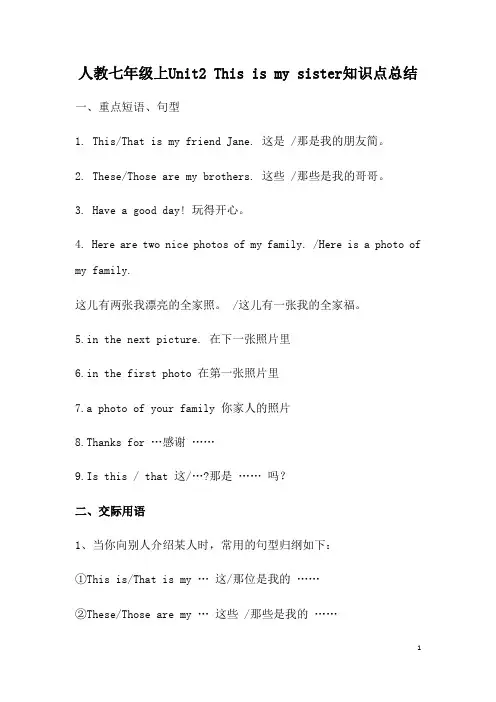
人教七年级上Unit2 This is my sister知识点总结一、重点短语、句型1. This/That is my friend Jane. 这是 /那是我的朋友简。
2. These/Those are my brothers. 这些 /那些是我的哥哥。
3. Have a good day! 玩得开心。
4. Here are two nice photos of my family. /Here is a photo of my family.这儿有两张我漂亮的全家照。
/这儿有一张我的全家福。
5.in the next picture. 在下一张照片里6.in the first photo 在第一张照片里7.a photo of your family 你家人的照片8.Thanks for …感谢……9.Is this / that 这/…?那是……吗?二、交际用语1、当你向别人介绍某人时,常用的句型归纲如下:①This is/That is my …这/那位是我的……②These/Those are my …这些 /那些是我的……③He/She is my …他/她是我的……④They are my …他们是我的……⑤This/That is her/his …这/那是她的 /他的……⑥These/Those are her/his …这些 /那些是她的 /他的……⑦He/She is his/her …他/她是他的 /她的……⑧They are her/his …他们是她的 /他的……2.当你想辨别某人是谁时,常用句型归纳如下:①Is this/that your …?这/那位是你的……吗?②Are these/those your…?…这些 /那些是你的……吗?③Is he/she your …?他/她是你的……吗?④Are they your …?他们是你的……吗?⑤Is this/that her/his…?这/那位是她的 /他的……吗?⑥Are these/those her/his …?这些 /那些是她的 /他的……吗?⑦Is he/she his/her …?他/她是他的 /她的……吗?⑧Are they her/his …?他们是她的 /他的……吗?三、语法1、指示代词 this ,these; those that 的用法。

【课堂笔记】人教版七年级英语上册Unit2基础识记1.your father and mother 你的爸爸和妈妈2.an uncle/aunt 一位叔叔/阿姨3.his aunts and uncles 他的阿姨和叔叔们4.my four fris 我的四个朋友5.her parents 她的父母6.my family tree 我的家谱7.your brother/sister 你的兄弟/姐妹.these two girls 这两个女孩9.in the first picture 在第一张图片里10.in the next picture 在下一张图片里11.have a good day 过得愉快12.my family photo 我的全家福13.a photo of my family 我家人的一张照片14.her cousin 她的表兄15.the name of my dog 我的狗的名字16.in my family 在我的家庭里17.two photos/pictures 两张照片1.my grandparents 我的祖父母重点句型1.This is my fri, Jane. 这是我的朋友,简。
2.These are my brothers. 这些是我的兄弟们。
3.Those are my parents. 那些是我的父母。
4.That is my family. 那是我的全家。
5.—Are these/those your parents?这些/那些是你的父母吗?—Yes, they are. 是的,他们是。
6.—Who's he? 他是谁?—He's my brother, Paul.他是我的兄弟,保罗。
7.—Who're they? 他们是谁?—They're my grandparents.他们是我的(外)祖父母。
.Here are two nice photos of my family.这是我家的两张好看的全家福。
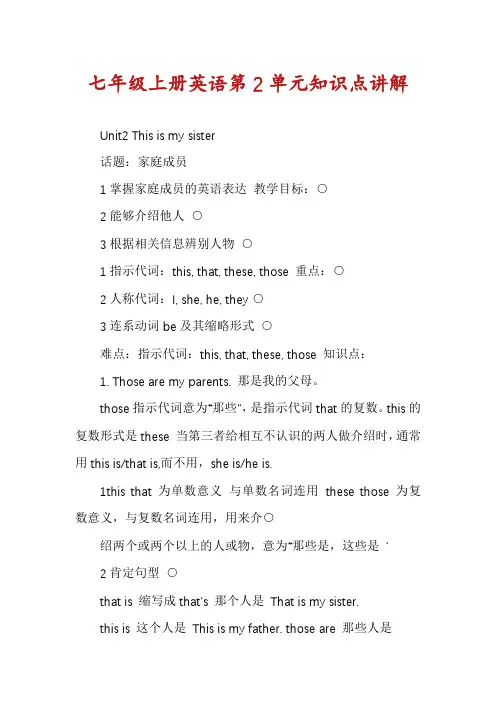
七年级上册英语第2单元知识点讲解Unit2 This is my sister话题:家庭成员1掌握家庭成员的英语表达教学目标:○2能够介绍他人○3根据相关信息辨别人物○1指示代词:this, that, these, those 重点:○2人称代词:I, she, he, they ○3连系动词be及其缩略形式○难点:指示代词:this, that, these, those 知识点:1. Those are my parents. 那是我的父母。
those指示代词意为“那些”,是指示代词that的复数。
this的复数形式是these 当第三者给相互不认识的两人做介绍时,通常用this is/that is,而不用,she is/he is.1this that 为单数意义与单数名词连用these those 为复数意义,与复数名词连用,用来介○绍两个或两个以上的人或物,意为“那些是,这些是’2肯定句型○that is 缩写成that’s 那个人是That is my sister.this is 这个人是This is my father. those are 那些人是Those are my parents. these are 这些人是These are my friends. 练习1. That______(be)my family. That’s my si ster!2. This________(be)my friends.3. He_____(be) a boy.4. I_____(be) Zhai Wenfei.5. She_____(be) a girl.3一般疑问句○Is that your sister? Is this your father? Are those your parents? Are those your friends? 陈述句变为一般疑问句调be动词调到句首改把我改成你加其他成分抄上去4一般疑问句回答○对is this/that 的肯定回答是Yes, it is. 否定是No, it isn’t.对these/those 的肯定回答是Yes, they are 否定回答是No, they are not. 规律Yes/No, 改this/that 改it these/those改them 反主语与be动词反过来5提问人用who ○who后面用is 还是are取决于be动词后面的名词的单复数who is/ are Who is Zhai Wenfei? Who is this boy? Who is she? Who are they?2. And who’s he?还有他是谁?Who 疑问代词,意为“谁”who宾格whom, 在句中作宾语时,二者在口语中可互换,所有格whose 3. Well, have a good day! 好吧,祝你们玩的愉快!1well用在句子开头,其后加逗号,用在重新开始说话。
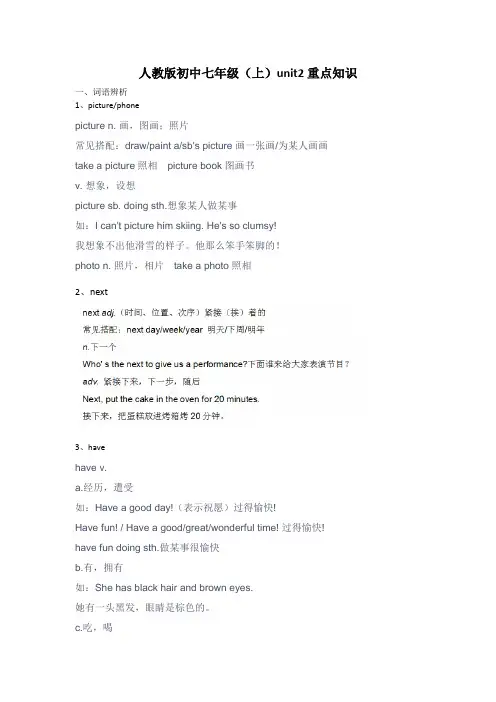
人教版初中七年级(上)unit2重点知识一、词语辨析1、picture/phonepicture n. 画,图画;照片常见搭配:draw/paint a/sb's picture 画一张画/为某人画画take a picture照相picture book图画书v. 想象,设想picture sb. doing sth.想象某人做某事如:I can't picture him skiing. He's so clumsy!我想象不出他滑雪的样子。
他那么笨手笨脚的!photo n. 照片,相片take a photo照相2、next3、havehave v.a.经历,遭受如:Have a good day!(表示祝愿)过得愉快!Have fun! / Have a good/great/wonderful time! 过得愉快!have fun doing sth.做某事很愉快b.有,拥有如:She has black hair and brown eyes.她有一头黑发,眼睛是棕色的。
c.吃,喝如:I usually have breakfast at about 7 o'clock.我通常在7点钟左右吃早餐。
4、family二、重点语法指示代词的近指和远指this、that、these、those这四个词是指示代词,用来指示或标识人或事物。
通常,我们谈论离自己近的人或物时用this/these。
this为单数指示代词,these为复数指示代词。
谈论离自己远的人或物时用that/those。
that为单数指示代词,those为复数指示代词。
例:This is my mother.这是我的妈妈。
This girl is Mary.这个女孩是Mary。
These are my parents.这是我的父母。
I like these flowers.我喜欢这些花。
例:That is my father.那是我的爸爸。
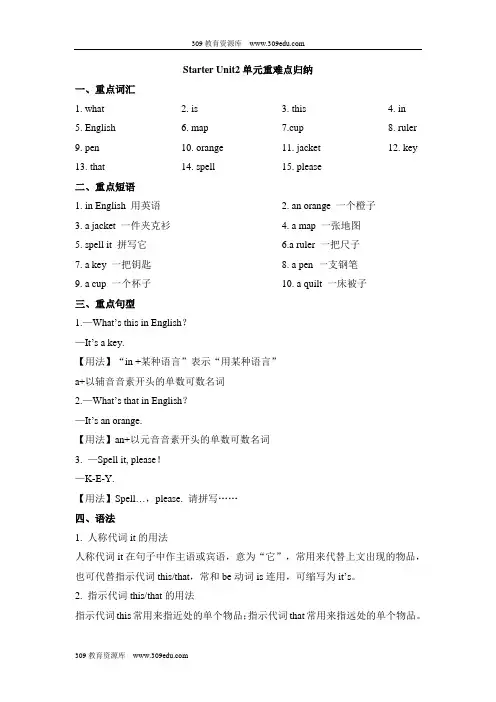
Starter Unit2单元重难点归纳一、重点词汇1. what2. is3. this4. in5. English6. map7.cup8. ruler9. pen 10. orange 11. jacket 12. key13. that 14. spell 15. please二、重点短语1. in English 用英语2. an orange 一个橙子3. a jacket 一件夹克衫4. a map 一张地图5. spell it 拼写它6.a ruler 一把尺子7. a key 一把钥匙8. a pen 一支钢笔9. a cup 一个杯子10. a quilt 一床被子三、重点句型1.—What’s this in English?—It’s a key.【用法】“in +某种语言”表示“用某种语言”a+以辅音音素开头的单数可数名词2.—What’s that in English?—It’s an orange.【用法】an+以元音音素开头的单数可数名词3. —Spell it, please!—K-E-Y.【用法】Spell…,please. 请拼写……四、语法1. 人称代词it的用法人称代词it在句子中作主语或宾语,意为“它”,常用来代替上文出现的物品,也可代替指示代词this/that,常和be动词is连用,可缩写为it’s。
2. 指示代词this/that的用法指示代词this常用来指近处的单个物品;指示代词that常用来指远处的单个物品。
3. 不定冠词a/an的用法冠词是置于名词之前,说明名词所表示的人或事物的一种虚词。
不定冠词常表示“一”的概念,有两种形式:a和an。
a用在以辅音音素开头的名词前,an用在以元音音素开头的名词前。
特殊情况:(1)元音字母u的读音以辅音音素开头,因此“一个u”应表达为“a u”。
(2)以元音字母开头的词以辅音音素开头,其前面用a。
如:a useful book 一本有用的书a uniform 一套制服a European country 一个欧洲国家(3)以辅音字母开头的词,辅音字母不发音,而以元音音素开头,其前面用an。
人教版七年上Starter Unit 2 What’s this in English?1.指示代词this/that的用法:this“这,这个”,指近处的事物。
that“那,那个”,指远处的事物。
(1)pron. 用来指单个的事物,在句中充当主语、宾语、表语。
What is this?这是什么?This is a pen. 这是一支钢笔。
(2)adj. 用于单数可数名词前。
在句中充当定语。
This book is Lucy’s. 这本书是露西的。
2.red n. 红色;adj. 红色的(1)n. I like red. 我喜欢红色。
(2)adj. She’s wearing a red skirt.她穿着红裙子。
3.what pron. & adj. 什么(1)pron. 在句中充当主语、宾语、表语。
What’s this? 这是什么?(表语)What do you eat for lunch? 你午饭吃什么?(宾语)(2)adj. What color do you like? 你喜欢什么颜色?(定语,限定color)What grade are you in? I’m in grade one.你在几年级?我在一年级。
What languge do you speak?你讲那种语言?What animal do you like?你喜欢什么动物?4..in prep(1)表示“在……里”I am in class one. 我在一班。
She is in class one. 她在一班。
(2)表示用某种语言What’s this in English/Chinese/Japanese?这个用英语/汉语/日语怎么说?What’s the English for 碗?“碗”用英语怎么说?with和in作用讲的区别:in指用材料,with指用工具。
如:I write with a pen. 我用钢笔写。
Unit2 Section A 教材知识详解1.This is my sister.这是我的妹妹。
知识点1:介绍他人的句型This is...是我们把一个人介绍给别人时的常用句型。
当被介绍人处于近距离时,单数用This is…,复数用These are…;处于远距离时,单数用That is…, 复数用Those are…如:This is my friend. 这是我的朋友。
Are these your brothers? 这些是你的兄弟吗?That is my uncle.那是我的叔叔。
Those are my parents.那些是我的父母。
知识点2:this的用法this 做指示代词,意为“这,这个〞,用来指示或标识较近的人或物,常用于介绍某人的句型中。
this 做主语时,be 动词用单数形式is。
复数形式为these,意为“这,这些〞,be动词用复数形式are;用来指示或标识较远的人或物时,用that,意为“那,那些〞,复数形式为those,意为“那,那些〞。
单数复数this thesethat thoseis areThis is my friend.(指代人〕这是我的朋友。
Is this a map?(指代物〕这是一张地图吗?That is my brother. 那是我的兄弟。
知识点3:sister的用法sister做名词,意为“姐,妹〞,复数形式为sisters。
I have two sisters. 我有两个姐妹。
2. it, this 与that的区别1〕指代距离说话人近的人或物用this,指代距离说话人远的人或物用that。
This is an apple tree.That is an orange tree.2)指代放在一起的两样东西,先说this,后说that。
This is a pen. That is a pencil.这是一支钢笔,那是一支铅笔。
3〕在答复this 或that 做主语的疑问句时,要用it代替this 或that。
七年级上册英语第二单元总结知识点一、重点单词。
1. this.- 这;这个。
是指示代词,单数形式,用于指代离说话者较近的人或事物。
例如:This is my book.(这是我的书。
)2. that.- 那;那个。
也是指示代词,单数形式,用于指代离说话者较远的人或事物。
例如:That is his pen.(那是他的笔。
)3. these.- 这些。
是this的复数形式,用于指代离说话者较近的多个事物或人。
例如:These are my pencils.(这些是我的铅笔。
)4. those.- 那些。
是that的复数形式,用于指代离说话者较远的多个事物或人。
例如:Those are their bags.(那些是他们的包。
)5. family.- 家;家庭;家人。
作“家庭”讲时,视为单数;作“家人”讲时,视为复数。
例如:My family is a big one.(我的家庭是一个大家庭。
)My family are all at home.(我的家人都在家。
)6. father.- 父亲;爸爸。
口语中常说dad或papa。
7. mother.- 母亲;妈妈。
口语中常说mom或mum。
8. parent.- 父(母)亲。
复数形式是parents,表示“父母”。
9. grandfather.- (外)祖父;爷爷;外公。
口语中可称为grandpa。
10. grandmother.- (外)祖母;奶奶;外婆。
口语中可称为grandma。
11. grandparent.- 祖父(母);外祖父(母)。
复数形式是grandparents,表示“(外)祖父母”。
12. son.- 儿子。
13. daughter.- 女儿。
14. cousin.- 堂兄(弟、姐、妹);表兄(弟、姐、妹)。
15. uncle.- 叔叔;伯伯;舅舅;姑父;姨父。
16. aunt.- 姑母;姨母;伯母;婶母;舅母。
17. photo.- 照片。
Unit2单元要点总结一、介绍他人的句型This is...是我们把一个人介绍给别人时的常用句型。
当被介绍人处于近距离时,单数用This is…,复数用These are…;处于远距离时,单数用That is…,复数用Those are…。
如:This is my friend. 这是我的朋友。
Are these your brothers? 这些是你的兄弟吗?That is my uncle.那是我的叔叔。
Those are my parents.那些是我的父母。
二、单元语法点1. 指示代词的用法this 做指示代词,意为“这,这个”,用来指示或标识较近的人或物,常用于介绍某人的句型中。
this 做主语时,be 动词用单数形式is。
复数形式为these,意为“这,这些”,be动词用复数形式are;用来指示或标识较远的人或物时,用that,意为“那,那些”,复数形式为those,意为“那,那些”。
单数复数this thesethat thoseis areThis is my friend. (指代人)这是我的朋友。
Is this a map? (指代物)这是一张地图吗?That is my brother. 那是我的兄弟。
造句:This is my sister. That is his brother. She is his aunt. He is my uncle.These are her parents. Those are her friends. They are my family.2. it, this 与that的区别1)指代距离说话人近的人或物用this,指代距离说话人远的人或物用that。
This is an apple tree.That is an orange tree.2)指代放在一起的两样东西,先说this,后说that。
This is a pen. That is a pencil.这是一支钢笔,那是一支铅笔。
Unit 2一.含有be动词的句子(am , is , are )1.变一般疑问句,be提前(I变you,my 变your ,some 变any)2.变否定句,be后加not (some 变any)二.指示代词指示代词(demonstrative pronoun)是表示指示概念的代词,即用来指示或标识人或事物的代词。
指示代词与定冠词和人称代词一样,都具有指定的含义,用来起指示作用,或用来代替前面已提到过的名词。
指示代词分单数(this / that)和复数(these / those)两种形式,既可作限定词又可做代词1.含有this或that的问句,答句用it代替2.含有these或those的问句,单句用they代替三.全家福1.one's family photo=the photo of one's family2.Photo复数photos四.parent父母之一parents父母双亲五.cousin既可是男,也可是女六.特殊疑问代词who,谁,什么人who做主语,谓语通常为单数1.他是谁? Who's he ? 答:He's ….2.他们是谁?Who are they ? 答:They are ….1.过得愉快!2.过得愉快!Have a good time3.过得愉快!Have fun4.过得愉快!Have a good day5.某人过得愉快! Enjoy oneself.后接doing九.可数名词变复数1)一般情况加–s:map-maps boy-boys2)以s, sh, ch, x结尾加–es, bus-buses watch-watches box-boxes brush-brushes3)以辅音字母+y结尾,变y 为i再加es, baby---babies city-cities country-countries4)以o结尾的名词,变复数时,辅音字母加o结尾加–es, 元音字母加o 加–szoo-zoos kangaroo-kangaroos potato- potatoes tomato-tomatoes hero-heroes Negro-Negroes5)以f或fe 结尾的名词变复数时去f,fe 加ves,如:half---halves,knife---knives leaf---leaves wolf---wolves wife---wives life---lives thief---thieves;6)国籍,中日不变英法变,其他S加后面名词复数的不规则变化1)child---children foot---feet tooth---teeth mouse---mice man---men woman---women2)单复同形,如deer,sheep,fish,Chinese3)oo常常变ee,foot——feet又一例;男人女人a变e , woman ——women又一例;还有一个要牢记,child复数是children;鹿(deer)和绵羊(sheep)是一家,单数,复数无变化。